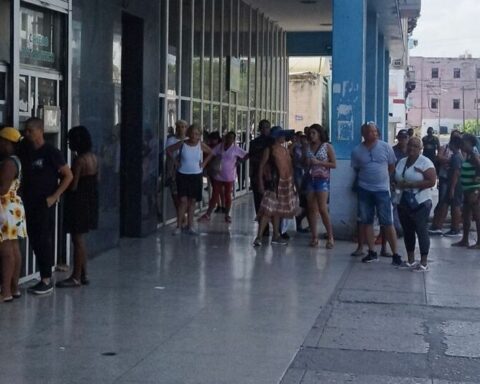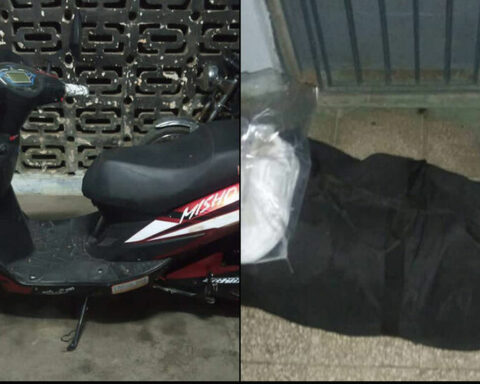The crisis hits all of Cuba, but the state sector suffers doubly. To the lack of raw material is added looting by employees. The most recent solution to reduce these thefts has been to apply the so-called “perpetual inventory” in community kitchens in Havana, which consists of supplying merchandise daily instead of storing it for several weeks.
In El Cubano, belonging to the Family Care System (SAF) and located on Aguiar Street, between Obispo and O’Reilly streets, in Old Havana, “since this week the perpetual inventory has been put into practice,” he told this newspaper a worker from this dining room, which is mainly attended by the elderly and people with disabilities. “Now, the products that are going to be consumed will enter the warehouse daily, not like before, when products entered for the month or fortnight,” he details.
“This is a diabolical invention and, although we knew that this concept of perpetual inventory or perpetual warehouse existed, as it is also called, it had never been implemented here. We have a worker who now, every day in the afternoon, has to go to look for the merchandise on a tricycle at the central warehouse of the Gastronomy Company, that will be what will be cooked the next day”, he explains.
“This means more work and more paper, now we have to do each double and triple delivery model but they don’t give us paper”
“There they should give you the products for the amount of assisted that eat in our premises every day, which now number close to a hundred.” The employees of El Cubano attribute the measure to the change of municipal director of the SAF, who previously worked in the Ministry of Commerce. “This is a super control for the there is super misery,” says the source.
“This means more work and more paper, now we have to do each double and triple delivery model but they don’t give us paper. In a first column we have to put the products, another for the price, another for the quantity that entered and another for the one that came out. With this new mechanism there is nothing left, it is left at zero”. For three days, the soup kitchen has only sold “rice and a small piece of chicken, plus pea soup.”
In Cuba there are some 76,175 people registered with the SAF who attend 445 kitchens of this type on the island. Users of this service frequently complain about the poor quality of food preparation, which often lacks spices, olive oil, or fats. The deterioration of the dishes is due, to a large extent, to the looting of products carried out by the employees themselves.
Despite the fact that the variety of ingredients has decreased significantly in recent years, the SAF maintain a basic offer that includes rice, some grains and a little animal protein that is often diluted between masses of croquettes or bland hamburgers. Prices range from 1.55 pesos for a ladleful of black beans to 2.15 pesos for a boiled egg or one peso for a small round loaf.
Although the prices seem cheap compared to other gastronomic establishments, the majority of SAF consumers have minimum pensions that do not go beyond 1,500 pesos. Most of them are also elderly people who live alone and must pay for their homes’ electricity, transportation and many other expenses out of their own pockets.
The employee does not look favorably on the new measure of daily limiting the amount of products they receive and having to account for the use of these foods
“This is a very sensitive system, because any failure directly affects people who have no other chance to put some food in their mouths,” acknowledges another employee of El Canciller, a SAF near the Havana neighborhood of La Timba. “People think we steal and that’s why the food is so bad, but here I have colleagues who even bring seasonings from home so that lunch tastes like something to old people.”
The employee does not look favorably on the new measure of daily limiting the amount of products they receive and also having to render accounting accounts on the use of these foods. “What it is going to bring is more bureaucracy and that we are not going to be able to plan to stretch some ingredients,” she laments.
“If it is designed for more control, what it is going to achieve is to drive us crazy and the quality of the food drops even more, because the day the protein does not arrive, lunch is going to have to come out like this, while now we always try to alternating and distributing what we have in stock during the week to achieve a menu that is as varied as possible”.
“More workers are planning to leave because it is not worth the effort to come, even less because in Gastronomy wage payments are often late. In a place near here, the administrator has already started the paperwork to retire on the run because he says that with this like this he does not work”, he adds.
However, the reason for applying this method differs if officials are asked. While in places like El Cubano and El Canciller, workers have been informed that this is a measure to prevent the diversion of goods and maintain more effective control over resources, sources from the Ministry of Agriculture and the state-owned Acopio consulted by this newspaper point to other reasons.
“We cannot know how much food we are going to have to take to Gastronomia and then to the dining rooms in a week, much less in a month,” warns a Collection official linked to the supply of these community premises. “Little merchandise is coming in, especially rice, beans and root vegetables, so we are going to distribute little by little.”
Fuel problems also aggravate the situation. “We have less than half of the trucks that we used to bring the merchandise to the city, because the lack of parts and fuel are affecting us a lot. The day a buchito arrives that same day we have to take it to the place So”.
________________________
Collaborate with our work:
The team of 14ymedio is committed to doing serious journalism that reflects the reality of deep Cuba. Thank you for joining us on this long road. We invite you to continue supporting us, but this time becoming a member of our newspaper. Together we can continue transforming journalism in Cuba.








